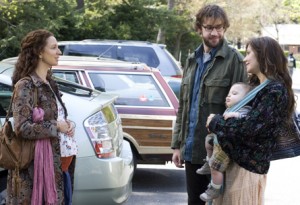Away We Go
 There’s an undiagnosed illness that most people don’t know about. But it can affect their personalities completely. Away We Go, Sam Mendes’ (American Beauty, Revolutionary Road) new comedy-drama about a couple (John Krasinski, Maya Rudolph) going through their first pregnancy and how they travel all across the country to try to find the best place to nest, suffers intensely from this disease.
There’s an undiagnosed illness that most people don’t know about. But it can affect their personalities completely. Away We Go, Sam Mendes’ (American Beauty, Revolutionary Road) new comedy-drama about a couple (John Krasinski, Maya Rudolph) going through their first pregnancy and how they travel all across the country to try to find the best place to nest, suffers intensely from this disease.
As Rudolph and Krasinski visit friends and family in places like Phoenix, Montreal, etc., we discover that they are the blandest and most boring people in the world, and those that they are attempting to reconnect with, are loud, uncouth, obnoxious, pretentious, broken, or barren. At least that’s true from the couple’s perspective. But as is pointed out in several scenes, they haven’t accomplished anything with their lives, the pregnancy was an accident, and they would have been perfectly happy to have made no impact on anyone else’s life. This inertia is the crux of the illness, known as Eric Roth’s disease. Eric Roth is the screenwriter of Forrest Gump and The Curious Case of Benjamin Button, in which all sorts of things happen to the characters, but they themselves are totally inactive, personality-free, innocent, simplistic, and an empty-headed figure for others to react to for their quirks and/or disfigurements — none of which develop these walking wastes of space’s personality. Meanwhile, those who do try to change their lives or experiment are destined to fail and be thoroughly punished for it.
Krasinski and Rudolph have nothing to play. They are a stand-in for the audience in the same way that Styrofoam peanuts protect the contents of your package — lifeless, breakable, malleable, and totally unrelated to what they are assigned to protect (in this case, a baby). Krasinski is especially cursed with a scraggly-beard-and-glasses nerd combo, emphasizing his enormous nose and forcing an ineffectual reaction to his character. He was a mistake to cast, simply because he has no natural screen presence (there’s a reason he’s on TV), and Rudolph isn’t helped by being defined by her large stomach, and nothing else. A better combination might have been Owen Wilson with Rudolph, as he brings a strange energy to everything he does, and he doesn’t have to scream to get your attention.
 The result of Away We Go‘s charm vacuum at its center is that it turns it into a road movie where you’d rather be anywhere else. I assume we’re supposed to be appalled by the behavior of the character actors who show up in city after city. Krasinski’s parents, played by Jeff Daniels and Catherine O’Hara, are selfish and uncaring. Rudolph’s former boss, Alison Janney, curses, talks about how great her breasts used to be, calls her kids names, and simultaneously ignores them. Maggie Gyllenhaal, forced to play a broad caricature (“After I’d had my child, when I watched CNN, I felt like I understood war”), is new-agey and coddles her kids to the point of harming them. Another couple, played by Chris Messina and Melanie Lynskey, shield their children from what they perceive to be the negative things of the world, so they have to adopt, because they can’t have kids of their own.
The result of Away We Go‘s charm vacuum at its center is that it turns it into a road movie where you’d rather be anywhere else. I assume we’re supposed to be appalled by the behavior of the character actors who show up in city after city. Krasinski’s parents, played by Jeff Daniels and Catherine O’Hara, are selfish and uncaring. Rudolph’s former boss, Alison Janney, curses, talks about how great her breasts used to be, calls her kids names, and simultaneously ignores them. Maggie Gyllenhaal, forced to play a broad caricature (“After I’d had my child, when I watched CNN, I felt like I understood war”), is new-agey and coddles her kids to the point of harming them. Another couple, played by Chris Messina and Melanie Lynskey, shield their children from what they perceive to be the negative things of the world, so they have to adopt, because they can’t have kids of their own.
But eventually, you wedge yourself free from the condescending tone, or sympathizing with the judgmental couple (well, at least I did), the Garden State soundtrack choices, and the complete lack of a sense of place (witless title cards announce each new location, because there’s nothing at all distinctive about the way each of them is shot), and become fascinated with the specifics of the other relationships. Away We Go works so much better as a drama, since the jokes are all of the “Ain’t they wacky?” sitcom style.
The interest really sets in with Lynskey and Messina’s family. They are fascinating because their troubles are manufactured by society — as if those who are adopted and, in other words are specifically chosen, are worth less than those made by a careless use of condoms. Their sadness is real and palatable, and if you find yourself wishing the movie would go off and be about them, you’re not alone.
 The general shallowness of the script is rather surprising considering one of the authors was Dave Eggers, who runs the magazine McSweeney’s, and wrote the groundbreaking self-reflexive novel/auto-biography A Heartbreaking Work of Staggering Genius as well as the Sudanese civil-war novel What is the What. Eggers’ inherent skills in making the sad funny, and the funny sad, should be ideally suited to an aimless journey of self-discovery story. But the second half of the film is the only successful part (especially the material dealing with Krasinski’s brother, an abandoned single father). And we spend too much time near the end of the film being told that we should wonder about Krasinski’s and Rudolph’s future.
The general shallowness of the script is rather surprising considering one of the authors was Dave Eggers, who runs the magazine McSweeney’s, and wrote the groundbreaking self-reflexive novel/auto-biography A Heartbreaking Work of Staggering Genius as well as the Sudanese civil-war novel What is the What. Eggers’ inherent skills in making the sad funny, and the funny sad, should be ideally suited to an aimless journey of self-discovery story. But the second half of the film is the only successful part (especially the material dealing with Krasinski’s brother, an abandoned single father). And we spend too much time near the end of the film being told that we should wonder about Krasinski’s and Rudolph’s future.
If Patton Oswalt was right when he said that if he were to have kids, the only album he’d own would be Phil Collins’ No Jacket Required so he could make sure he was the lamest parent possible (therefore creating a very cool kid who would rebel, unlikely to accept the status quo), then the sole guarantee about the dull, irritating parents at the center of Away We Go is that they will have the coolest kid in the world.



